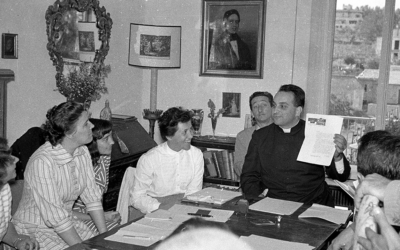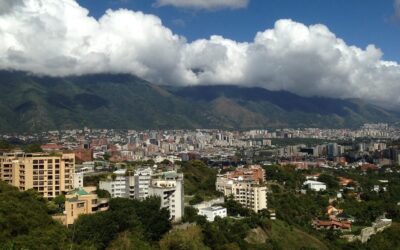 Also in Tagaytay, Cebu e Davao “Bukas Palad” is a center in one of the poorest neighborhoods of Manila and focuses on the integral development of the person, the family and the society. Similar centers have begun in Tagaytay, near the Peace Citadel, as well as in the heart of the Philippine Archipelago in Cebu, and the far south in Davao where there is a large Muslim population. 23 Assistance programs reaching more than 6000 families: more than 3,200 children and teens are taught in the schools and colleges; more than 7,000 people receive care in the ambulatories; food and milk are distributed daily to more than 2,000 children; 1,872 children are sustained in adoption-from-afar programs; the TB prevention programs have been awarded for their efficiency; loans to begin small businesses have been given to 1,600 families; 259 families have had their houses repaired while 285 have been hooked up to running water and sewage systems; while numerous courses on family planning using natural methods are offered. Local Production: tailoring, carpentry, ice cream, bread and other food shops create their own merchandise and sell them at low prices to more than 4,500 families. Some News: a computer school for youth; a summer workshop for youth and couples. 50 lower-.income homes have been built for our poor families. In the four centers in which “Bukas Palad” is subdivided, 60 persons are working full time along side 330 volunteers. Many of these have adhered to the life and spirit of the Movement over the years. A Place to Meet Persons of Other Religions: From the beginning, “Bukas Palad” has been a place to encounter Buddhists from Japan, Taoists from Cebu and Muslims from Davao. People of different convictions have worked at the center and discovered the beauty of the Christian community. The Awakening of a Social Consciousness: “Bukas Palad” has cut deeply into the Philippine social fabric awakening a social consciousness that the country has often lacked. Embassies, banks, schools, hospitals and various NGOs, therefore, have begun helping and now hundreds of people are involved. The Beginning: A group of young people began the center in 1983, calling it “Bukas Palad” which means “with open hands”. They took as their motto the words “Freely you have received, freely you shall give” (Mt 10,8). They began with very little – 2,000 pesos (around $150) from the sale of used clothes. With that sum they began a small ambulatory. It was a miserable area along a canal: a long row of make-shift houses without plumbing or electricity, but full of illness, criminality and desperation. As soon as the word spread that such a center had begun, young people from all directions began coming to offer their assistance. They understood that God wanted more from them. A doctor here and there was not enough, neither was the good will of a few nurses. Various members of the Movement began offering their service.
Also in Tagaytay, Cebu e Davao “Bukas Palad” is a center in one of the poorest neighborhoods of Manila and focuses on the integral development of the person, the family and the society. Similar centers have begun in Tagaytay, near the Peace Citadel, as well as in the heart of the Philippine Archipelago in Cebu, and the far south in Davao where there is a large Muslim population. 23 Assistance programs reaching more than 6000 families: more than 3,200 children and teens are taught in the schools and colleges; more than 7,000 people receive care in the ambulatories; food and milk are distributed daily to more than 2,000 children; 1,872 children are sustained in adoption-from-afar programs; the TB prevention programs have been awarded for their efficiency; loans to begin small businesses have been given to 1,600 families; 259 families have had their houses repaired while 285 have been hooked up to running water and sewage systems; while numerous courses on family planning using natural methods are offered. Local Production: tailoring, carpentry, ice cream, bread and other food shops create their own merchandise and sell them at low prices to more than 4,500 families. Some News: a computer school for youth; a summer workshop for youth and couples. 50 lower-.income homes have been built for our poor families. In the four centers in which “Bukas Palad” is subdivided, 60 persons are working full time along side 330 volunteers. Many of these have adhered to the life and spirit of the Movement over the years. A Place to Meet Persons of Other Religions: From the beginning, “Bukas Palad” has been a place to encounter Buddhists from Japan, Taoists from Cebu and Muslims from Davao. People of different convictions have worked at the center and discovered the beauty of the Christian community. The Awakening of a Social Consciousness: “Bukas Palad” has cut deeply into the Philippine social fabric awakening a social consciousness that the country has often lacked. Embassies, banks, schools, hospitals and various NGOs, therefore, have begun helping and now hundreds of people are involved. The Beginning: A group of young people began the center in 1983, calling it “Bukas Palad” which means “with open hands”. They took as their motto the words “Freely you have received, freely you shall give” (Mt 10,8). They began with very little – 2,000 pesos (around $150) from the sale of used clothes. With that sum they began a small ambulatory. It was a miserable area along a canal: a long row of make-shift houses without plumbing or electricity, but full of illness, criminality and desperation. As soon as the word spread that such a center had begun, young people from all directions began coming to offer their assistance. They understood that God wanted more from them. A doctor here and there was not enough, neither was the good will of a few nurses. Various members of the Movement began offering their service.
Pray for unity
Pray for unity




0 Comments